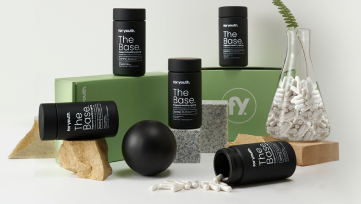The Role of Quercetin in Cardiovascular Health


 Shop our Quercetin
Shop our Quercetin 
This article delves into the role of Quercetin in promoting cardiovascular health.
Beyond its cardiovascular advantages, Quercetin plays a significant role in respiratory health, making it a multifaceted flavonoid worth considering for overall wellness. As research progresses, science suggests that Quercetin supplementation could offer a range of health benefits, from mitigating inflammation—often linked to chronic diseases—to bolstering the immune system.
For an in-depth look at its anti-inflammatory properties, read about Quercetin for inflammation. Meanwhile, those seeking to enhance their immune defenses might find value in understanding how Quercetin supplements could boost immunity.
Discover more about the power of Quercetin and its potential to enrich daily health regimens. If you’re considering integrating Quercetin into your diet through supplementation, it’s critical to know the factors when choosing a Quercetin supplement to ensure quality and effectiveness.
To explore how Quercetin can be seamlessly incorporated into your daily routine, visit our guide on establishing a Quercetin daily health regimen.
We will explore its sources, examine scientific studies that underscore its potential benefits, discuss its inclusion in dietary supplements, and provide guidance on integrating it into your diet while considering potential side effects and precautions.
Key Takeaways
Quercetin is a potent flavonoid with antioxidant properties found in fruits, vegetables, and grains.
- Scientific evidence shows that quercetin can reduce oxidative stress, lower blood pressure, and inhibit plaque formation in arteries, benefiting heart health.
- Incorporating quercetin-rich foods like capers, lovage, elderberries, and red onions into your diet can contribute to enhanced cardiovascular health.
By signing up, you consent to receive For Youth emails
Get The Latest On Longevity Delivered To Your Inbox.
Understanding Quercetin: Basics and Sources
Quercetin, a powerful flavonoid present in substantial quantities in various fruits, vegetables, and grains, plays an integral role in maintaining cardiovascular health. This compound, classified as a polyphenolic antioxidant, assists in reducing inflammation and fighting free radicals. Its antioxidative properties have been extensively studied, revealing potential benefits in preventing heart diseases and stroke.
Sources rich in quercetin include onions, apples, berries, and even some kinds of tea and wine. Moreover, quercetin is also available as a dietary supplement for those who may struggle to consume enough through diet alone.
To enhance your understanding of quercetin’s multifaceted health benefits, it’s important to explore its impact beyond heart health. Emerging research suggests that quercetin can be instrumental in boosting the immune system, making it a formidable ally during the cold and flu season.
Additionally, its contribution to eye health and vision support is gaining attention, as it may help safeguard against age-related ocular conditions. For those seeking synergistic effects, combining quercetin with other nutrients like zinc can form the ultimate combo for enhanced absorption and efficacy.
Parents may also be interested in the advantages quercetin offers to children, as it emerges as a powerful antioxidant for the younger demographic. With its vast therapeutic potential, quercetin is quickly becoming a cornerstone supplement for individuals aiming to uphold a comprehensive health regimen.
As it is a naturally occurring substance, it generally poses minimal risk, making it a valuable addition to a heart-healthy lifestyle.
Quercetin and Heart Health: Scientific Evidence
Numerous scientific studies have consistently demonstrated the potential benefits of quercetin intake for heart health.
As a potent antioxidant, quercetin reduces oxidative stress, a key factor in the development of heart disease. Research indicates it may lower blood pressure and reduce the risk of atherosclerosis, a condition characterized by plaque buildup in the arteries.
A 2012 meta-analysis of 7 randomized controlled trials revealed a significant reduction in systolic and diastolic blood pressure with quercetin supplementation.
Another 2019 study showed that quercetin could inhibit the formation of plaque in arteries.
While more research is needed to fully understand its mechanisms, the existing body of scientific evidence strongly supports quercetin’s beneficial role in heart health.
Potential Cardiovascular Benefits of Quercetin
Several potential cardiovascular benefits of quercetin have garnered attention in the scientific community, primarily due to its antioxidant properties and potential impact on blood pressure and atherosclerosis. The antioxidant nature of quercetin helps counteract the damaging effects of free radicals in the body, thus aiding in the prevention of heart diseases. Quercetin’s ability to reduce systemic inflammation and enhance endothelial function also plays a crucial role in maintaining cardiovascular health.
Quercetin in Dietary Supplements

 Shop our Quercetin
Shop our Quercetin 
Dietary supplements often incorporate quercetin due to its potential health benefits, particularly in the realm of cardiovascular wellness. This flavonoid is found in a variety of fruits and vegetables and is a potent antioxidant.
When considering quercetin in dietary supplements, four key points have to be taken into account:
- Quercetin supplements typically come in capsule or powder form, making them easy to incorporate into daily routines.
- These supplements can contain varying amounts of quercetin, commonly between 250 to 500 mg per serving.
- Quercetin supplements are often combined with other nutrients, such as vitamin C or bromelain, to enhance absorption.
- While generally considered safe, quercetin supplements may cause side effects in some individuals and should be taken under the guidance of a healthcare professional.
Adding Quercetin to Your Diet
How can one incorporate more quercetin into their diet to potentially improve cardiovascular health? There are various food sources rich in quercetin that can be easily included in your daily meal plan. Regular consumption can help boost your quercetin intake, which may contribute to enhanced cardiovascular health.
Potential Side Effects and Precautions
Despite the potential cardiovascular benefits of increasing quercetin intake, it is essential to consider the potential side effects and precautions associated with this dietary modification.
- Gastrointestinal Discomfort: High doses of quercetin can cause stomach discomfort, including heartburn and nausea.
- Drug Interactions: Quercetin may interact with medications, including antibiotics and blood thinners, potentially altering their effectiveness.
- Potential Kidney Damage: High doses consumed over a prolonged period may cause kidney damage.
- Allergic Reactions: Although rare, some individuals may experience an allergic reaction to quercetin, which can manifest in symptoms such as rashes or breathing difficulties.
Always consult a healthcare provider before starting any new supplement regimen, including the addition of quercetin to your diet.
What You Need To Know About For Youth
For Youth demystifies the science of longevity, making it accessible to everyone. With the view of considering aging as a “disease” that can be cured, we aim to help individuals slow down or even reverse aging at a cellular level, ultimately leading to a healthier and longer life.
Aging is the underlying cause of various health issues, ranging from minor problems like wrinkles to severe diseases like Alzheimer’s or cancer. By slowing down the aging process, one can significantly improve their overall health and well-being.
For Youth offers a biological age test and a range of science-backed, lab-tested, and carefully sourced supplements, such as NMN or resveratrol, to help you monitor and counteract the effects of aging.
Quercetin by For Youth
⇒ The Zombie – Quercetin Singapore

Description:
Quercetin is a scientifically-backed, plant-based anti-aging supplement. The Quercetin Phytosome™ acts as both an antioxidant and senolytic, effectively targeting and eliminating senescent or “zombie” cells to promote a longer, healthier life. By removing these harmful cells, quercetin helps to reduce inflammation, alleviate allergy symptoms, strengthen the immune system, improve athletic performance, and address a variety of age-related issues.

While some companies may ambiguously mention “made in XXX”, they may not provide full disclosure about the chain of production. Unlike these companies, For Youth is committed to complete transparency and shares the details of our supply chain at every step of the process.
Sourced from Italy
Indena, the firm behind Quercetin Phytosome™, is a company with over a century’s worth of history based in Italy, specializing in herbal ingredients. They innovated the Phytosome™ technology to markedly escalate the bioavailability of ingredients typically not effectively absorbed by our bodies.
Produced in Italy
The flowering extract of the Sophora japonica or Japanese pagoda tree is refined into Quercetin Phytosome™ in Italy. The state-of-the-art Phytosome™ technology develops a free-flow matrix preventing quercetin from clumping and heightening its absorption rate dramatically. This innovation leads to an extraordinary 20-fold improvement in absorption relative to standard quercetin.
Encapsulated in France
Our Quercetin product is encapsulated within vegetarian capsules at our affiliate facilities located in France.
Bottled in Singapore
The Quercetin capsules are transported in large quantities to our Singapore location. Upon arrival, a third-party laboratory tests the capsules, which are then bottled by our partner at their pharmaceutical facilities in Singapore.
Conclusion
In conclusion, quercetin has emerged as a potential powerhouse in the realm of cardiovascular health. Its scientifically-backed benefits, from inflammation reduction to blood pressure regulation, illuminate its promise.
Despite the necessity for more comprehensive studies, incorporating quercetin into our dietary regimen could potentially fortify our cardiovascular well-being.








